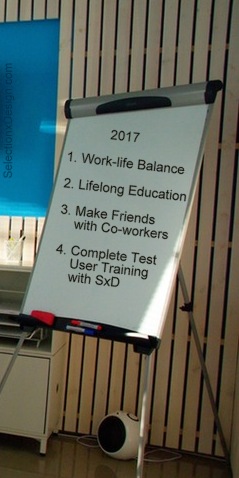Did you make any work-life resolutions this year? Are you doing what you set out to do, or have plans slipped by the wayside?
The holidays are over, we’ve survived Blue Monday. Now is a great time to focus on how you’ll bring about changes related to work-life that can have a positive impact on your health, happiness and well-being.
What resolutions will work best? How can you get serious about sticking with what you set out to do?
3 Resolutions that can Improve your Work-life
1. Focus on work-life balance.
When your job fits well with the rest of your life and you feel fulfilled and as if your needs are met both at work and in non-work areas of your life, healthy work-life balance has been achieved. You’ll experience greater satisfaction in your job and in your life. It’s likely you’ll feel good and behave in ways that are favorable for success with your job.
Facilitating work-life balance should be a given for employers, as it’s to their advantage to have happy and productive workers. Employees who feel like they are important are likely to have greater enthusiasm for their jobs and to put greater effort into the work.
But whether work-life balance is cultivated at your workplace or not, you can take steps to make it a priority for yourself. Some ideas include creating and sticking to a simple daily routine that includes plenty of sleep, regular time outdoors, eating right and exercising, and time for hobbies and activities you enjoy. It’s almost a guarantee your mental clarity will improve along with your creativity. You may find it’s quite possible to complete necessary tasks and still leave work on time every day when your life flows according to a strong daily routine.
In addition to developing a daily routine, explore other ways that may help you improve work-life balance. If you rarely or ‘never’ take a holiday, plan to take one soon. Maybe you’d benefit from a simple strategy for unplugging from work during down time; stop checking work email unless you’re on the job. Remember that regardless of what your employer offers in terms of work-life balance support, if you want greater job and life satisfaction, it’s up to you to achieve it.
2. Set yourself up for success with lifelong learning.
Does it already feel a bit like you’re getting bogged down in the same old, same old on the job this year? Educating yourself continually is a terrific way to avoid stagnation in your routine, your work and your thinking. Strive to learn something new every single day by reading an article, or talking to a colleague who has expertise you’re curious about. Read a book, online journal or newspaper daily.
If your employer offers opportunities for continued education, take advantage of that, too. Education may make your job easier to perform, or facilitate you being able to perform at a higher level. Discuss such opportunities with your employer as you find them. You may be able to benefit your organization or your team as you learn new skills, gain expertise or expand your credentials.
There are virtually endless ways you may incorporate ongoing education into your lifestyle. Whether it’s a formal course you take through your employer or a book you read on your own, learning and developing yourself continually offers significant advantages for your health, well-being and success.
3. Make friends with your co-workers.
Socialization and the development of supportive, trusting relationships at work can increase your workplace satisfaction. A sense of belonging and community can enhance your well-being and may help you avoid burn out, too. When you can depend on your co-workers, you have somewhere to go when you feel stressed out or overwhelmed. A strong social support network that includes co-workers can be of benefit both personally and professionally.
Your employer should value and strive to encourage camaraderie at the work place, as it can help with retention and productivity among other things. But whether or not you’re actively encouraged to socialize, fostering friendships will take proactive effort on your part.
Instead of focusing on ‘keeping your distance,’ try spending some time with your co-workers. Get to know them by treating them with empathy, kindness and respect. Have fun and show some compassion. You don’t have to lose work time to socializing to start to be a bit friendlier. That’s all it may take to begin to develop positive relationships at work that grow into rewarding, mutually beneficial friendships.
Put Your Resolutions into Practice
Now that you know what you’d like to achieve through work-life resolutions this year and why, it’s time to put your resolutions into practice. Instead of trying to implement sweeping changes all at once, take things slow.
Change doesn’t need to be swift or drastic to be effective. Small tweaks or shifts in your daily routine can build into habits one by one, over time. If you find it a struggle to avoid checking work emails at night, stop doing so for just an hour during a meal. Work your way up to your goals. It will take time to develop meaningful friendships with co-workers, so don’t try to make it happen in one day!
Break each of your resolutions into small steps. Work on them one by one instead of all at once. Choose an action stick to doing it, even if it’s very simple—perhaps getting up at the same time every day, or chatting with a co-worker for one or two minutes each morning for 2 weeks.
Remember: the type of resolutions described here are NOT designed to be put into practice overnight. Plan to take the whole year to achieve them!
Have you resolved to complete your Occupational Test User Training in 2017? Now’s the time to register for our first training dates of the new year! Discounts are available for students and those who register for both courses. If you have any questions about our training, please contact us.



